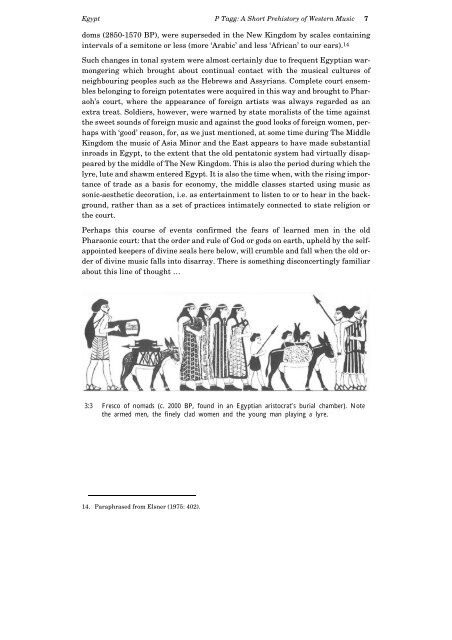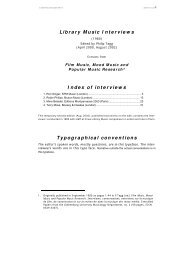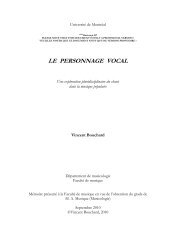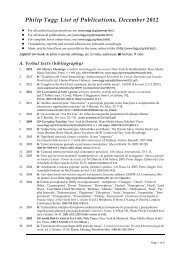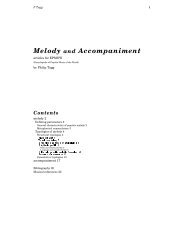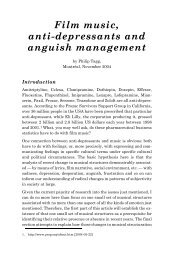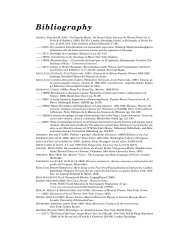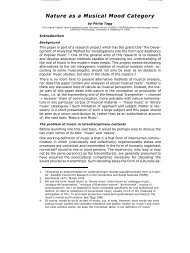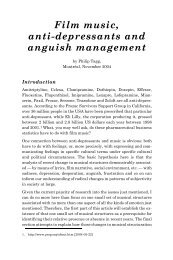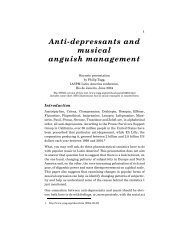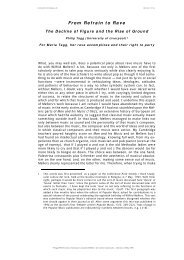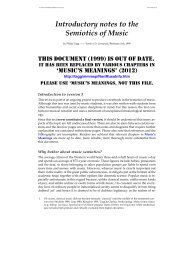A Short Prehistory of Western Music, Chapter 3
A Short Prehistory of Western Music, Chapter 3
A Short Prehistory of Western Music, Chapter 3
You also want an ePaper? Increase the reach of your titles
YUMPU automatically turns print PDFs into web optimized ePapers that Google loves.
Egypt P Tagg: A <strong>Short</strong> <strong>Prehistory</strong> <strong>of</strong> <strong>Western</strong> <strong>Music</strong> 7<br />
doms (2850-1570 BP), were superseded in the New Kingdom by scales containing<br />
intervals <strong>of</strong> a semitone or less (more ‘Arabic’ and less ‘African’ to our ears). 14<br />
Such changes in tonal system were almost certainly due to frequent Egyptian warmongering<br />
which brought about continual contact with the musical cultures <strong>of</strong><br />
neighbouring peoples such as the Hebrews and Assyrians. Complete court ensembles<br />
belonging to foreign potentates were acquired in this way and brought to Pharaoh’s<br />
court, where the appearance <strong>of</strong> foreign artists was always regarded as an<br />
extra treat. Soldiers, however, were warned by state moralists <strong>of</strong> the time against<br />
the sweet sounds <strong>of</strong> foreign music and against the good looks <strong>of</strong> foreign women, perhaps<br />
with ‘good’ reason, for, as we just mentioned, at some time during The Middle<br />
Kingdom the music <strong>of</strong> Asia Minor and the East appears to have made substantial<br />
inroads in Egypt, to the extent that the old pentatonic system had virtually disappeared<br />
by the middle <strong>of</strong> The New Kingdom. This is also the period during which the<br />
lyre, lute and shawm entered Egypt. It is also the time when, with the rising importance<br />
<strong>of</strong> trade as a basis for economy, the middle classes started using music as<br />
sonic-aesthetic decoration, i.e. as entertainment to listen to or to hear in the background,<br />
rather than as a set <strong>of</strong> practices intimately connected to state religion or<br />
the court.<br />
Perhaps this course <strong>of</strong> events confirmed the fears <strong>of</strong> learned men in the old<br />
Pharaonic court: that the order and rule <strong>of</strong> God or gods on earth, upheld by the selfappointed<br />
keepers <strong>of</strong> divine seals here below, will crumble and fall when the old order<br />
<strong>of</strong> divine music falls into disarray. There is something disconcertingly familiar<br />
about this line <strong>of</strong> thought …<br />
3:3 Fresco <strong>of</strong> nomads (c. 2000 BP, found in an Egyptian aristocrat’s burial chamber). Note<br />
the armed men, the finely clad women and the young man playing a lyre.<br />
14. Paraphrased from Elsner (1975: 402).


